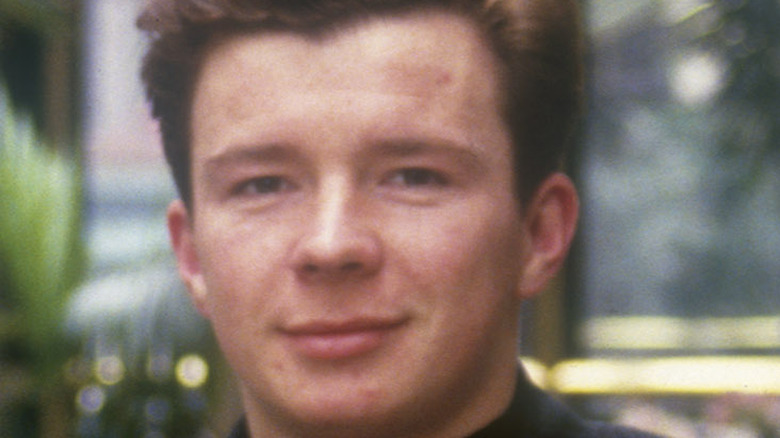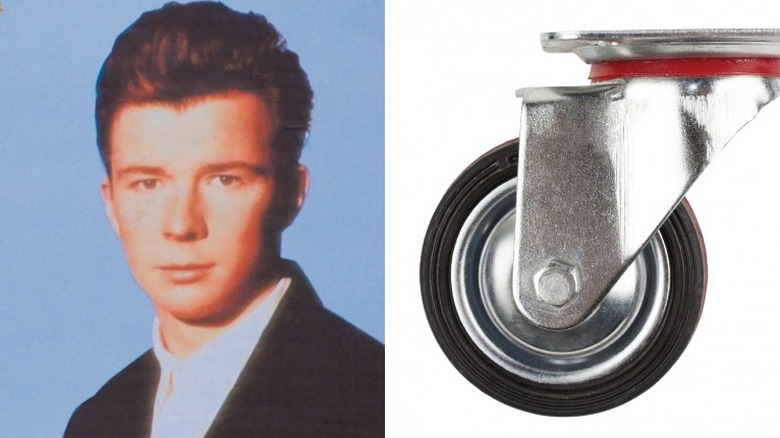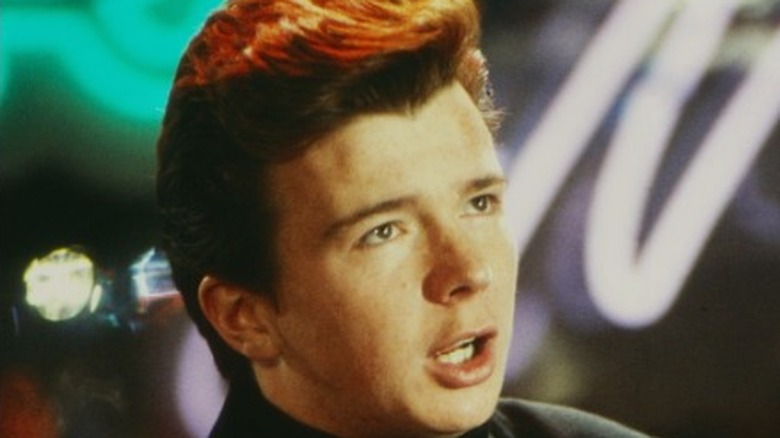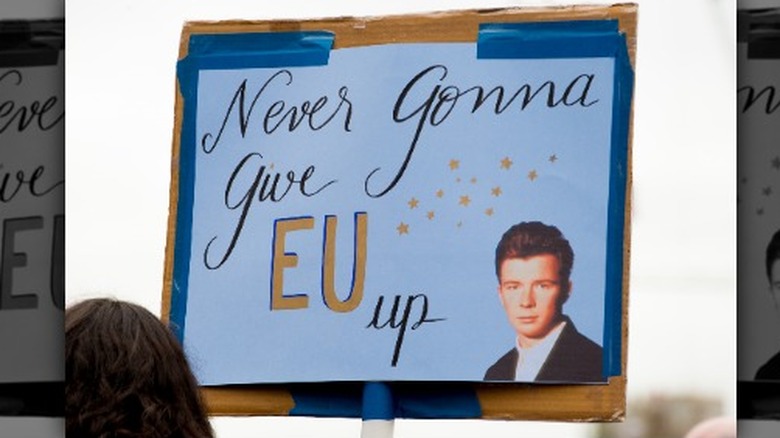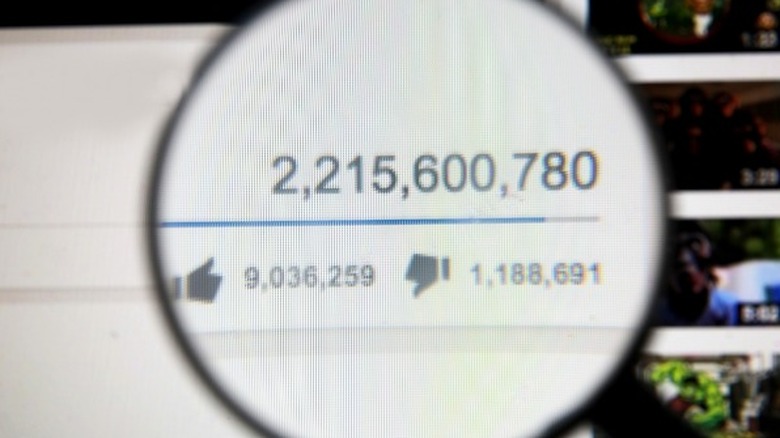The History Of Rick Astley's Rickroll
Richard Paul Astley, age 56, was born in Lancashire, United Kingdom (according to Express UK). He has produced no less than seven albums over the course of his decades-long music career. The BBC reported that in 1987, he released his debut album entitled "Whenever You Need Me," featuring the pop-synth track "Never Gonna Give You Up." The song topped the charts in the late 1970s, according to Billboard, and Rick Astley's stardom was on the rise.
He never asked for this.
20 years later, in May 2007, his early work would come back to haunt him. Rick Astley's 1987 track "Never Gonna Give You Up" would become the basis for an early internet prank known as rickrolling. Rick Astley, and the world, would never again escape it.
In March 2008, a spokesperson for Rick Astley replied to reporters from Fox News with the unmistakable ire of a man who's fed up: "I'm sorry, but he's done talking about rickrolling."
20 Years Later, Rick's Work Returns to Haunt Him
Rickrolling is a bait-and-switch internet meme characterized by a seemingly innocuous or unrelated link that actually leads to a video of the 1987 song "Never Gonna Give You Up," performed by Rick Astley. According to Fox News and Mel Magazine, the meme took off on the controversial website known as 4chan.
According to the Guinness Book of World Records, the first documented rickroll — and the one to launch the phenomenon — was a post by a 4chan user in video game imageboard /v/ in May 2007. The first rickroll appropriated the memetic structure of "duckrolling," another bait-and-switch setup dominating 4chan at the time.
The format was born when a moderator implemented a word filter to automatically replace the word "egg" with "duck," resulting in ridiculous amalgams like "duckroll." A running joke evolved, in which users baited the reader by posting a clickbait-esque title or faux news headline with a hyperlink. When clicked, the link would redirect to an image of a duck on wooden wheels (for reasons that were never explained and may not even exist at all).
Rick Will Give You Up, & Rick Will Let You Down
In May 2007, a 4chan user shared a link that he claimed was a preview for the highly-anticipated game Grand Theft Auto IV. The link, however, redirected to a video of the 1987 song "Never Gonna Give You Up" performed by Rick Astley (per the Guinness Book of World Records and Know Your Meme). This led to the evolution of a new meme known as rickrolling, which entailed posting a clickbait title or seemingly unrelated hyperlink to set up the expectations of the user, then redirecting them to a video of the 1987 song "Never Gonna Give You Up" by Rick Astley instead. (Reddit user u/FriddyNanz explained it here.)
Within a year, "rickrolling" would prove so infectious that even corporations knew what it was. Nearly 15 years later, rickrolling has become more than a classic: It was a formative structural memetic style that would influence internet culture more broadly, and even the world.
Your Heart's Been Aching, But You're too Shy to Say It
After the meme first surfaced on 4chan in May 2007, it took less than a year for it enter the mainstream — perhaps due to the fact that rickrolling is, in itself, an act of surprise that only exists through replication. According to Know Your Meme, rickrolling first truly rose to modern heights of notoriety on April 1, 2008, when Youtube decided to redirect every video on its homepage to the 1987 song "Never Gonna Give You Up" by Rick Astley as an April Fool's prank. The world became aware of rickrolling, its frustrations, and its joys.
From 2007 to 2008, rickrolling was everywhere. In its golden age, the meme was used by corporations, activists, politicians, and pranksters alike.
Google Trends shows an overwhelming spike in search activity for "rickrolling" beginning in April 2008. Things only escalated from there.
Rick Just Wants to Tell You How He's Feeling
Another milestone in the meme's rise to prominence was its use by Anonymous at a protest against Scientology. The 1987 song "Never Gonna Give You Up" by Rick Astley was also appropriated in a Wikileaks document (per Know Your Meme), played by Nancy Pelosi (per The Hill), and deployed to hijack a Westboro Baptist Church protest (2011, per Rolling Stone).
Other rickrolling perpetrators include the official White House Twitter Account (via Huffington Post), Apple Support (via Mel Magazine), Wikileaks (via Know Your Meme), and the Foo Fighters. Victims reportedly included ISIS (via Know Your Meme), the Church of Scientology (via The Guardian), and the pro-Brexit Vote Leave campaign (via The Guardian).
Rick Astley also appeared in the 2008 Macy's Thanksgiving Day Parade, lip syncing his own song. After being included in VH1's collection "The 50 Most Awesomely Bad Songs... Ever," according to Mel Magazine, rickrolling had finally brought Rick Astley to international renown (albeit, perhaps, not the way he might have wanted to get there). In November 2008, Rick Astley was nominated for the Best Act Ever award in the European Music Awards.
Please Stop Asking Him About Rickrolling
According to Esquire, July 2021 marked another milestone. With the Youtube video of the 1987 song "Never Gonna Give You Up" by Rick Astley landing a benchmark one billion views, it's safe to assume a noteworthy portion of those views were the result of a successful rickroll.
Rick Astley has accepted his fate, and he's been pretty gracious about it. According to Today I Learned, Astley first learned about rickrolling when he was rickrolled by a friend. Over the years, he has embraced, been perplexed by, and simply come to accept the phenomenon.
In his own words (as quoted in Today I Learned), "There's no getting away from it now...."
Astley appears to have last resurfaced on TikTok. He posted a rendition of his most famous (and only famous) song, perhaps accepting that he might as well stick to what he's known for. Over 30 years since the song's release and nearly 15 years since the meme first emerged, he has not, in fact, given it up.
